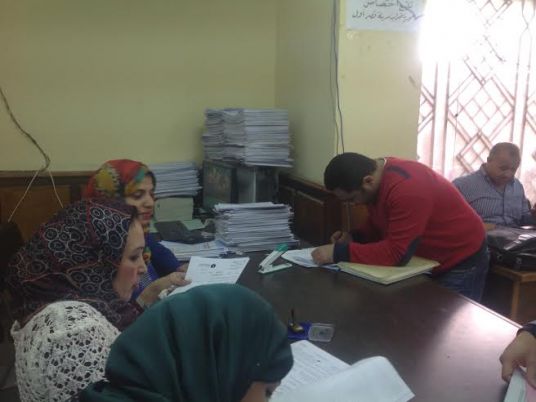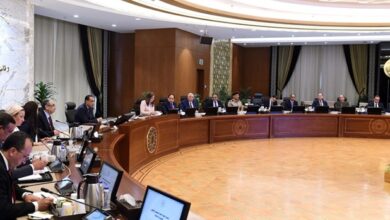Purging Egyptian public life of Mubarak-regime figures has been a central and consistent demand of Tahrir Square protesters. At its most extreme, it is manifested in nooses slung around homemade Hosni Mubaraks. Cleansing the government of dissolved National Democratic Party (NDP) remnants is one of the seven key demands that inspired the current Tahrir Square sit-in, currently beginning its third consecutive week.
Prime Minister Essam Sharaf (himself a former member of the NDP's influential policies secretariat) announced the formation last week of a new government. Several regime stalwarts, such as former Health Minister Ashraf Hatem and Minister of Antiquities Zahi Hawas, were shown the door following the shakeup, but one portfolio is being studiously ignored both by Sharaf and protesters: that of Fayza Abouelnaga.
Career diplomat Abouelnaga has headed the Ministry of International Cooperation (MIC) since 2001, when it was created (some say the MIC was created especially for her). Since the January unrest, her ministerial responsibilities have even expanded; she was made minister of planning during Prime Minister Ahmed Shafiq’s short-lived government in February, and survived the most recent shakeup to retain both posts. Before parliament was dissolved, Abouelnaga represented Port Said in the People’s Assembly via one of the 62 seats allocated by the women's quota.
While longevity under the Mubarak regime was never an indication of professional ability, several people who have dealt with her personally say that she is a talented and polished diplomat who is very good at her job.
However, exactly what she and her ministry do is somewhat unclear.
“If you asked Essam Sharaf what the MIC does, he wouldn’t be able to answer you. They make it highly complicated,” said an official within the Ministry of Foreign Affairs (MFA) who requested anonymity.
The MIC's busy website lists six tasks, including ratification of bilateral and multilateral treaties, approval of financial grants and loans, and debt restructuring – tasks that overlap with the MFA's jurisdiction.
Abouelnaga's diplomatic career began in 1975 as a member of Egypt's permanent delegation at the United Nations in New York. She acted as Boutros Boutros-Ghali's permanent legal advisor when he was elected as UN Secretary General in 1992.
From 1997 to 1999, she served as deputy foreign minister for bilateral African relations, and from 1999 to 2001 she was Egypt's permanent representative at the UN and other international organizations in Geneva. She was also permanent representative to the International Labor Organization and represented Egypt at numerous conferences during this period.
According to the foreign minstry official, the MFA had trouble containing her increasing authority, and so she was given the MIC.
As is the case at most Egyptian public institutions, career progression at the MFA is in part heavily dependent on what is known as wasta – connections – and it has been suggested that Abouelnaga's rise to the top was due to her close friendship with former first lady Suzanne Mubarak.
At the very least, Abouelnaga's performance in her main role – overseeing foreign aid – demonstrates a loyalty to the interests of Mubarak’s regime and shares its suspicion of Egyptian civil society.
Egyptian non-governmental organizations (NGOs) – particularly those working on politics and human rights – were heavily monitored and controlled under the Mubarak regime, via both discreet and overt harassment from the State Security Investigations Service (now renamed the National Security Agency), an oppressive legal framework governing their activities, and tight controls on funding, the last of which was the doing of Abouelnaga herself.
The minister is the gatekeeper for the millions of dollars that enters Egypt annually from abroad and, as is apparent from US diplomatic cables released by the whistleblower website Wikileaks, sets Egyptian policy on US aid to the country.
This policy is steered by the primary goal of extracting the maximum amount of funds from the American administration with the least possible oversight and conditions.
A February 2010 cable from the US Embassy in Cairo states that, “Abouelnaga has been the most vocal and unrelenting advocate of restructuring the US-Egyptian assistance relationship. (We note that most of the line ministries in the government continue to seek and appreciate the traditional role that USAID has played). She is the originator of the mega-endowment proposal that would eliminate [US aid to Egypt] over ten years, and, in her view, significantly limit the likelihood of political conditions being placed on endowment funding.”
The thinking behind the “mega-endowment proposal” is described in a 2009 cable, also from the US Embassy: “[The Egyptian government] sought to eliminate US ‘meddling' in their internal affairs by trying to persuade us to apply [US economic aid to Egypt] to debt relief or to an ‘endowment’ that once established would be more hands off.”
At the domestic level, the heavily-criticized Law 84 governing NGOs (passed in 2002, and which observers say Abouelnaga had a role in drafting) required that all NGOs be registered with the Ministry of Social Solidarity (MOSS) and allowed the regime to starve off funds from NGOs it viewed with disfavor.
It then either ignored applications for registration or rejected them on poorly defined (and therefore unchallengeable) “security” grounds.
NGOs get around this rule by registering as civil companies rather than NGOs, but their situation remains precarious. A 2008 US Embassy cable describes Abouelnaga urging USAID to cease funding six Egyptian organizations under its direct grants program after State Security seized children's books distributed to public schools and libraries by one of the groups in February.
The cable notes: “It appears that MIC is attempting to close a loophole in the civil companies law that we have used to fund civil society organizations which have either not been able to obtain Ministry of Social Solidarity registration (under Law 84 governing NGOs), or have not been able to obtain permission from that ministry to receive foreign funding.”
It adds that MOSS “has serially failed to register NGOs.”
Abouelnaga's most recent clash with USAID was in February of this year, when Secretary of State Hillary Clinton redirected US$165 million of US annual economic aid to support Egypt's transition, $65 million of which was to be allocated for “democratic development”.
Abouelnaga was incensed when USAID bypassed her ministry by holding an open day in its Cairo office for members of the public. She responded by sending a letter of complaint to the US Embassy.
“I’m not sure at this stage we still need somebody to tell us what is or is not good for us – or worse, to force it on us,” The Wall Street Journal quoted Abouelnaga as saying in response to Clinton's announcement.
The 2009 US Embassy cable talks about Egyptians refusing aid conditionality – that is, tying aid to improvements in, for example, the human rights situation in Egypt – because they are “proud”. Egyptian human rights activists, however, say this position is disingenuous, since the billions of dollars Egypt has received over the years have been directed by a policy that put the Mubarak regime’s interests over Egypt's development.
The MFA official said that Abouelnaga is part of a generation that regards a relationship between a foreign state and Egyptian private actors without going through a government filter as “infiltration”, and this is reflected in the latest government move on aid.
On 12 July, Abouelnaga announced a cabinet decision to form a fact-finding committee on direct foreign funding of civil society, a decision immediately condemned by NGOs as an extension of Mubarak's policy of discrediting civil society with the public.
"Abouelnaga is part of a generation of skilled diplomats who defended the regime for decades. I resent that they're using the rhetoric of colonialism to attack foreign aid," said an Egyptian activist who works in an international organization.
The resounding silence from Tahrir Square regarding Abouelnaga is explained, perhaps, by the relatively low-profile she has domestically, and also because she was recently held up as a hero after it was reported that she was part of a decision to refuse an unpopular $3 billion loan from the World Bank. Abouelnaga later said she had been misquoted.
Emad Mubarak, director of the Egyptian NGO called Association for Freedom of Thought and Expression, does not have an answer for her political survival.
“I don’t understand why Fayza Abouelnaga is still around. What’s the secret of keeping her, someone with very strong ties to the old regime, who played a terrible role in international relations, and she’s going around accusing everyone about everything… What is the secret? And if anyone has an answer I’d like to know. This is my question to the Prime Minister and the cabinet,” Mubarak said.




